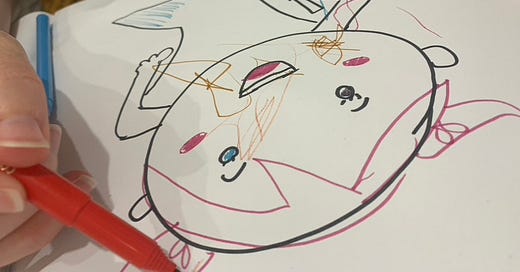Tiredness and hope this International Women’s Day
Yawwwwn: things that make me tired this International Women’s Day
Four years ago, I went to see the Guilty Feminist show when it came to Wellington. It was the last show for some time as we were just about to launch into Covid lockdown. Deborah Frances-White asked us, her hundreds of adoring fans, “who here tonight is really tired?” Almost all of the audience, 95% of them women, put up their hands. I remember being sleep-deprived at the time as my son was 9 months old and going through a sleep regression, and Covid was all over the news. Plus, I’m a woman, so therefore I’m tired. It’s crazy to think that was four years ago – and now, we’re more tired than ever.
Time magazine pinpoints ‘The Great Exhaustion’ as tiredness caused by the Covid pandemic, work, and the constant bombardment of negative news pertaining to things we have little control over (such as Palestine, and the war in Ukraine) (time.com).
I am so, so tired of seeing women and children bear the brunt of disadvantage and death during war. And I’m tired of governments not stepping up to condemn Israel’s actions, or there being an effective way to ensure peace. The bombardment on Palestine is horrific AND the bombardment of media about Palestine and other negative stories can make us feel hopeless, because there seems to be so little we can do about it. As the Time article says, this is ‘the exposure to stress outside of our control’, which can make us feel unseasonably tired. Add in ‘unsustainable lifestyles’ and ‘financial insecurity’ and you can see how things that have been strangely normalised in our society are contributing to this state of exhaustion. However, if we don’t have hope (which I’ll talk about at the end of this post), we get even more exhausted.
Financial insecurity is another thing I am tired of. In the current economy, with wild inflation levels and our own special Aotearoa supermarket duopoly, we are tired of spending more money every month on food. This financial insecurity affects single mothers, it affects women who are reliant on their partners’ income and therefore reliant on being in a relationship, and women on one income who are disadvantaged for simply being single. It can make it difficult for women to go out on their own and leave violent relationships.
My number one exhaustion-inducing bugbear: the cost of childcare.
One thing I desperately want to see change, is the high price of childcare. Over the last couple of years the price of early childcare has skyrocketed. The sector is struggling to pay its predominantly female staff and recruit enough teachers. Part of this is because of Pay parity legislation being bought in. It’s not so much that childcare centres don’t want to pay teachers what they’re worth, it’s just that they can’t afford it. Childcare centres are not funded enough to make up the shortfall (or so they say, but we’ll get to that!). It then falls to parents to make up the shortfall in high fees. I’ll give you a real-life example. In 2021, we paid $345 for one child per week (he was under 3, so we got no government subsidy; and was attending 5 days a week). In January 2023, fees for an under 3 year old for five days a week had increased to $380. (With a subsidy, which we were then receiving, it was $294 for five days). On the full day rate, that’s an increase of 10%. On top of this, we had a second child in daycare in 2023, who we were then paying full rates for. In 2023, we were paying $500 in childcare per week for two children (to attend four days a week).
This partially fueled us to switch to Kindergarten, which is something not everyone can do (long wait lists, and many Kindergartens close at 2.30pm). Kindergarten teachers have historically been paid more than daycare teachers, can be more experienced, and the fees are less. I asked a Kindy teacher today how Kindergartens can charge less. Her answer? Kindergartens are not-for-profits. This is where the problem lies – the majority of daycare centres in New Zealand are privately owned, and they can make millions of dollars in profit a year (I’m talking about the big chains). Kindergartens might be sole-trader or a network of not-for-profits. They’re not seeking to make a profit. There may be other reasons as well, but in researching this topic, I’ve found the fees and subsidies structures for early childcare to be complex and opaque. Please also bear in mind this is my personal opinion, not my professional one (disclaimer!)
This is an issue relevant to women because it impacts on female staff in the kindergarten or daycare and how much they get paid, it impacts on mothers and whether they have access to childcare, AND whether its affordable for women to work (we know that often women earn less than men because of the gender pay gap, so in some strange comparison game it’s their incomes that are srutinised against childcare costs rather than the household income - another topic altogether). This issue impacts children’s educational outcomes, too – whether they can learn the important social and emotional skills in early childhood settings, alongside other kids.
Things to be hopeful about this International Women’s Day
The thing I’m most hopeful about is that women don’t give up. There are lots of women/people out there still fighting for equal pay, for fair pay, and rallying against the war crimes commited in Palestine. They’re are out there protesting and organising themselves, shouting about gender-based violence of Palestinian women and the impacts on so many children. I would like to see a lot more done about financial insecurity in New Zealand, but for now, I see people in my community giving away food to others. They are organising themselves on social media to deliver food and other household items to people in need. Even the leftover lunches in schools are redistributed in the suburb I live in, to people in need.

I’ve also seen wider reporting on women’s health issues this year. I’ve previously written about endometriosis ( a condition I have, along with 120,000 New Zealand women). I’ve seen promising research done on new medication for endometriosis, the first new treatment approved in 13 years in Australia. There’s fascinating new research being done on how the menstrual cycle can change regions of our brains – brain structures that govern emotions, memory, and behaviour. Whether the brain changes alter the way women act, think and feel is still up for debate and further research. But in these areas of health research that are so difficult to obtain funding for, I am hopeful that more will be examined on periods, endometriosis and menopause.
What’s making you tired and hopeful this International Women’s Day?
Share with a friend and spread the love.






